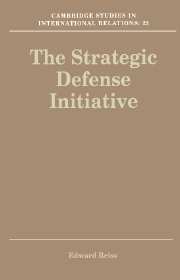Book contents
- Frontmatter
- Contents
- List of tables
- Acknowledgements
- List of abbreviations
- Introduction
- PART 1 CONCEPTION
- PART 2 CONSTRUCTION: 1983–1985
- PART 3 CONSOLIDATION: 1985–1988
- PART 4 CONTEXTS AND CONDITIONS
- 10 Europe
- 11 Military economy
- 12 The culture of ‘Star Wars’
- 13 The selling of SDI
- 5 CONCLUSIONS
- Notes
- Select bibliography
- Index
12 - The culture of ‘Star Wars’
Published online by Cambridge University Press: 18 December 2009
- Frontmatter
- Contents
- List of tables
- Acknowledgements
- List of abbreviations
- Introduction
- PART 1 CONCEPTION
- PART 2 CONSTRUCTION: 1983–1985
- PART 3 CONSOLIDATION: 1985–1988
- PART 4 CONTEXTS AND CONDITIONS
- 10 Europe
- 11 Military economy
- 12 The culture of ‘Star Wars’
- 13 The selling of SDI
- 5 CONCLUSIONS
- Notes
- Select bibliography
- Index
Summary
If the course of ‘Star Wars’ has often baffled observers, this may be due to its strange mingling of science and culture, expertise and popularisation. From its very inception SDI was both a high-tech programme and a popular idea, a mélange of physics, psycho-politics and metaphysics, attuned to the drives and dissatisfactions of the American people. Its secret strength lay in its emotive connotations, its capacity to motivate people by mobilising culture, discourse, emotion and fantasy.
AVOIDANCE
The imagination could hardly comprehend the sheer megatonnage of the nuclear arsenal. The horror can, however, be distanced or absorbed by the specialised language of evasion and euphemism which has been refined in ‘expert’ discussion of nuclear matters. The resulting discourse, sometimes called ‘nukespeak’, fosters group identity; its acronyms create a secret world of privilege and expertise. SDI has its own subdialect, replete with characters such as AMOS (Air force Maui Optical System), TOM (Threat Object Map), SAM (Surface to Air Missile) and SPOCK (Special Purpose Operating Computer Kernel). At the operational level, computer language homogenises the issues into a ‘colourless world of files, records, fields, reports, updates and processing’.
There is good reason for ‘professional’ fora to prefer the technocratic style of nukespeak, since their aim is negotiation and management, rather than self-disclosure or demagoguery. But, in focussing on techno-strategic details, the ‘experts’ usually disregard the presuppositions underlying debate.
- Type
- Chapter
- Information
- The Strategic Defense Initiative , pp. 153 - 164Publisher: Cambridge University PressPrint publication year: 1992



